The chant goes up, “You dirty vegan b*****d, you’re eating our grass.” The abuse is directed at a player of fourth-tier English soccer club Forest Green Rovers. He is lying face down and motionless after he’d been on the wrong end of a challenge from a Walsall FC player in a League Two game last month.
Forest Green, located in rural Gloucestershire in south west England, might be a lower-league club, but it has arguably become one of the most talked about football teams in the world. It has fan clubs in more than 50 countries and its new green and black zebra stripe shirt sold out in minutes at the start of the season with online orders coming from USA, China and Australia.
While some soccer teams get talked about for the number of trophies they’ve won or attractive style of play, Forest Green has a very different narrative. It is the only UN-recognised carbon neutral sports club
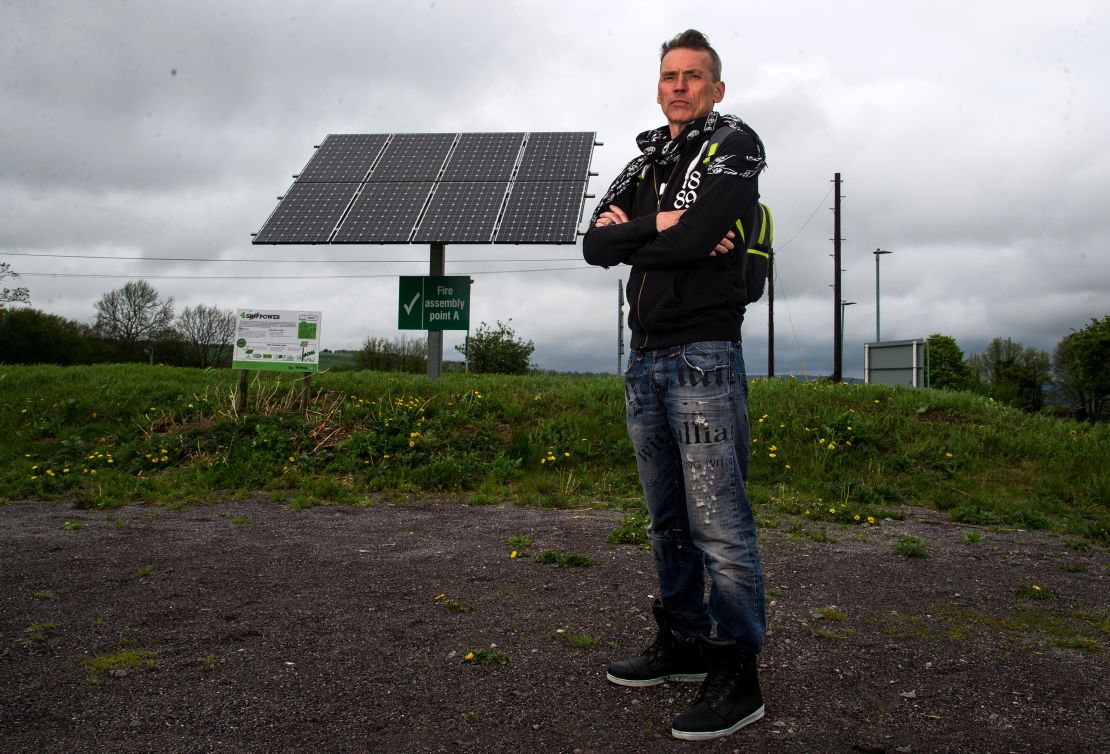
‘Decent thing to do’
At Forest Green, the team bus and lawn mower are both fully electric. The grass on the pitch is free from pesticide. The players’ shirts and shin pads are made from biodegradable bamboo. The soap in the bathroom is plant based and eco friendly. The food served on match days is completely free from animal products, and in 2017 the club was the first football team to receive the Vegan Trademark from the Vegan Society.
That the club exists to sell food of any sort is remarkable given it was facing extinction in 2010. Back then, relegation from the fifth tier of English football loomed as it teetered on the brink of economic collapse. Board members sought help from local businessman Dale Vince, who made his fortune after establishing the UK’s first renewable energy company Ecotricity in 1996. Vince, however, was reluctant.
“I never had a plan to own or run a football club or work in football in any way,” Vince told CNN Sport. “But the club was in trouble and was in our back yard. I knew how much it meant to the community and wanted to help it survive the summer. It seemed like the decent thing to do.”
READ: Premier League: Racist and homophobic incidents tarnish ‘best league in the world’
READ: Soccer star Megan Rapinoe named Sports Illustrated’s Sportsperson of the Year

Focus on food
But if Vince was to come on board, every facet of the club had to align with his green vision.
“We thought, ‘What if we could use football as a new channel for communicating?’” Vince said. “We thought we could have some fun creating a green football club and speak to the wider world of sport. What if we could make football fans equally passionate about the environment? We couldn’t do this without bringing our ethos and vision in to it.”
Of all the changes that have taken place over the intervening decade, the most talked about is unquestionably the food.
Apart from Walsall’s barbs directed at a concussed player, visiting fans have been heard chanting, “Where’s your burger gone?” to the tune of Lally Stott’s 1971 pop classic “Chirpy chirpy, cheep cheep.”
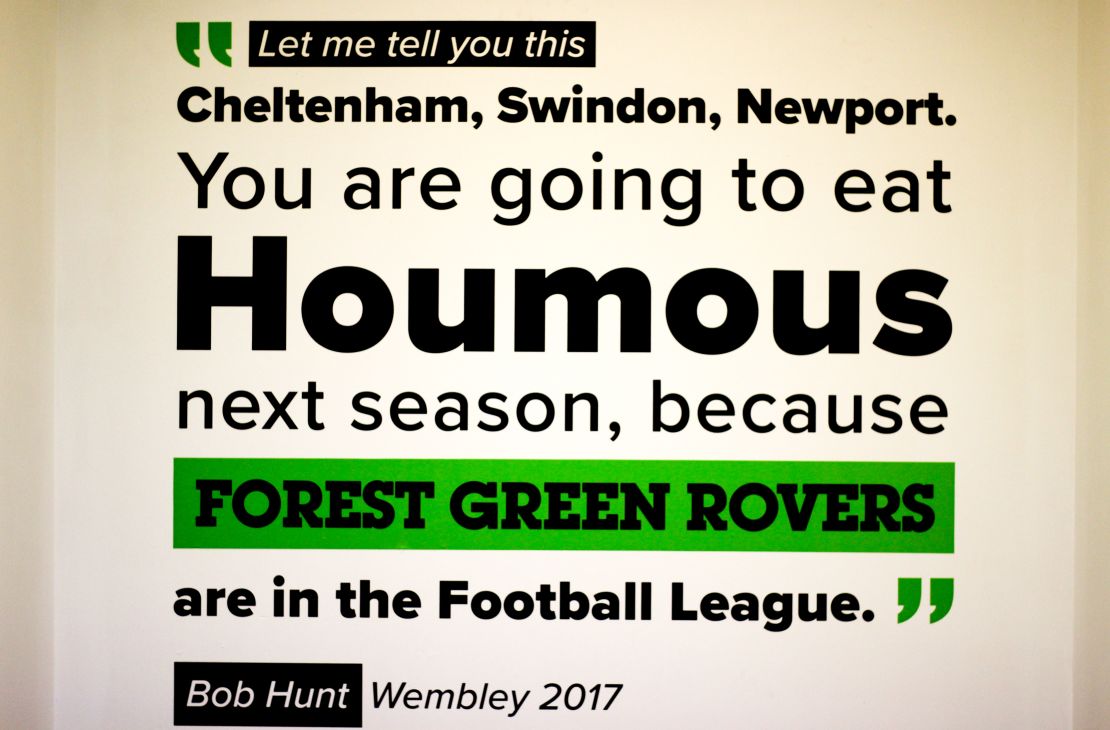
“Football is full of banter like that,” Vince said with a laugh, recalling a few other examples of unrepeatable food-based jibes. “Food is triggering for people. It’s a relatable topic that we can all find humor in. Everyone eats.”
After Forest Green earned promotion to League Two by winning a playoff match at Wembley Stadium against Tranmere Rovers, BBC commentator Bob Hunt roared, “Let me tell you this, Cheltenham, Swindon, Newport. You are going to eat hummous next season because Forest Green Rovers are in the Football League!”
Not everyone, however, has been on board. One fan, who asked to remain anonymous, said that many of her friends now only watch Forest Green at away matches, in search of bacon rolls. She said that the club has become “preachy” and “pushes the vegan agenda too much.”
“It seems to bother people when a vegan shows them that there is another way,” said Vince when asked why the vegan menu has become the main sticking point for critics. “But we’re conscious not to wag our fingers at anyone. We don’t want to be preachy. All we can do is live our lives and educate people who want to be educated. For every fan we lose, we’ve gained 10. Our attendances are at an all-time high.”
READ: Global emissions will hit another record high this year despite a slowdown in coal use
READ: Climate change is forcing one person from their home every two seconds, Oxfam says
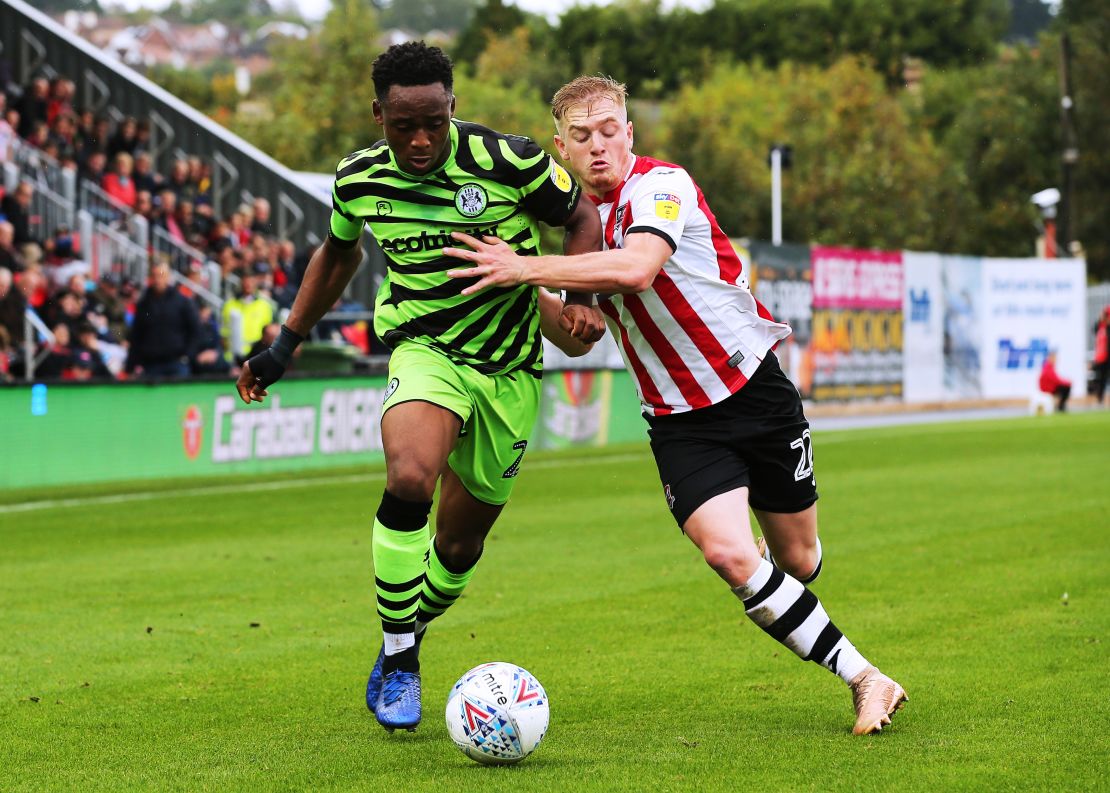
‘Swept up by his passion’
One convert is head groundsman Adam Witchell, who joined the club four years ago after earning a reputation in the industry for his plant-based approach to feeding nutrients in to his soil and combating the spread of fungus.
Professionally, it makes sense that Witchell and Forest Green found each other. What has been surprising, at least for Witchell himself, is how his life has changed as a result of this union.
“I never used to eat vegan food but my whole family now eats vegan meals at home,” Witchell said. “I drive an electric car, I’m conscious of my carbon footprint, I make sure I know where all the plastic I use ends up.”
Witchell continued: “It’s incredible what can happen when you have a leader like Dale. You get swept up by his passion. This football club has got so many people thinking about the environment. I have young kids and I wonder what sort of world I’ll be leaving them.”
READ: The climate crisis could make it more dangerous to play sports outdoors
READ: How climate change is affecting World Cup ski racing circuit

‘The power of sport’
Close to Forest Green’s stadium is Nailsworth Primary School. The school has been inexorably altered since Vince’s eco revolution touched down.
Local children are strongly encouraged to recycle and are educated on the effects of a warming planet. Two learners are selected every year to be Forest Green ambassadors and receive free kits and season tickets. Staff and students are offered discounted rates to attend matches and there are regular tours of the stadium where Forest Green workers show off the club’s many innovations.
“It shows the power of sport,” said Mark Davis, physical education coordinator at the school. “Forest Green has inspired the children and we use football as a vehicle to teach them some pretty complex themes such as the future of the planet.”
It’s not just new fans who have galvanized around the club’s new vision. Supporters who remember a time when the club played in black and white stripes now have even more reason to feel pride in the badge.
“It could have been any club in the country that became a leader in fighting climate change, but it’s our club,” said former player Alex Sykes, who is Forest Green’s most capped player of all time with 240 appearances.
“When I was here, we never spoke about vegan food or global warming. It’s fabulous what’s happened. I wish Dale came in 20 years sooner so I could have been a part of this.”
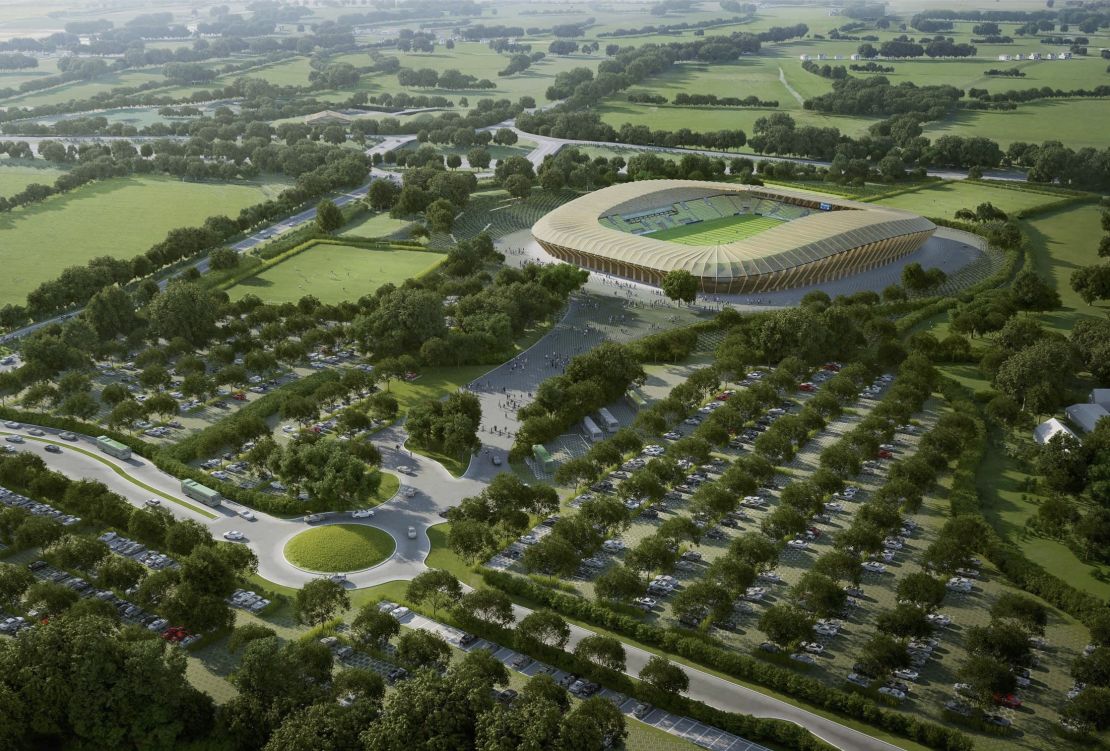
Fuel for high performance
When Sykes last played for Forest Green in 2004, the club had just been relegated to the sixth level on English football’s pyramid. Today, Vince has his sights on the Championship, the league just below the Premier League. The vegan diet is apparently not just saving the planet, but also improving on-field performance.
“We firmly believe that elite athletes should not be eating animal products,” Vince explained. “Cutting out red meat has been crucial. We speak to the players about energy output, increased stamina and injury prevention. That is why it was easy getting them on board.”
The club’s head chef Jade Crawford, who joined Forest Green two years ago in search of a job in a meat-free kitchen, is now inundated with recipe requests from players.
“I’ve shown them how delicious vegan food can be,” Crawford said. “They’re high performing athletes. They want to be at their best but they also want to eat tasty food. I’m immensely proud of the work we do here.”
The club even helped the United Nations draft the Sports for Climate Action Initiative which seeks to engage sports organisations in the discourse around climate change.
“We have 10 years to save the world,” Vince said. “We can no longer pretend otherwise.”
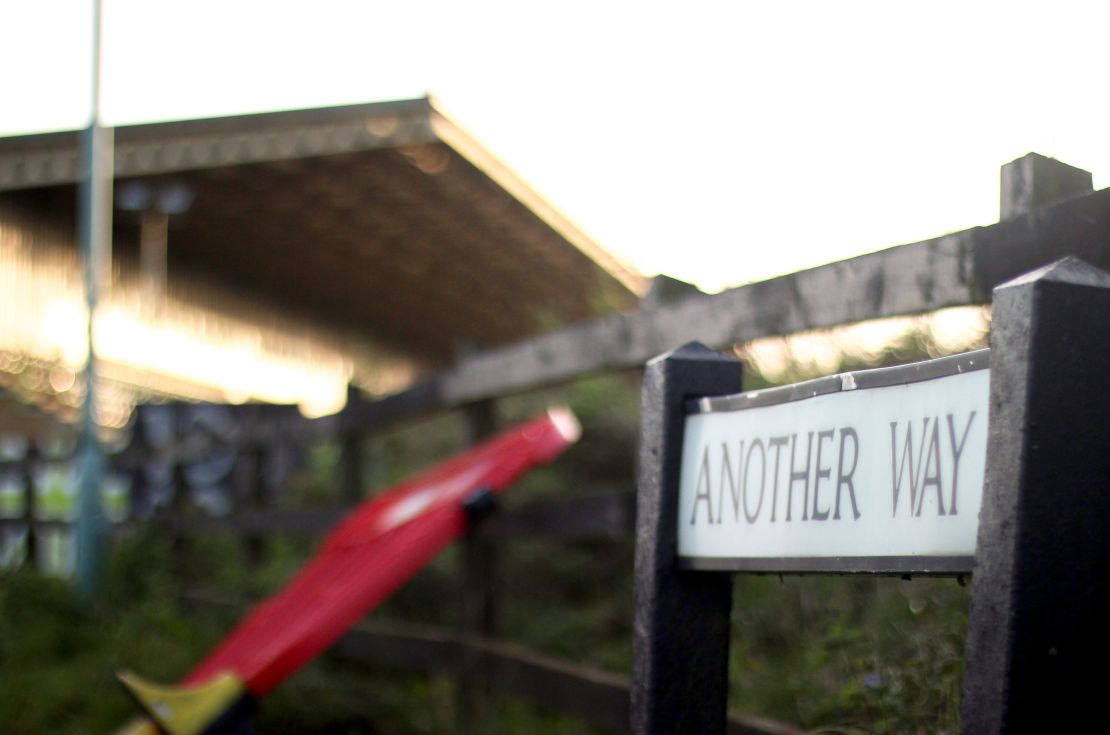
‘Greenest stadium in the world’
Vince has big plans beyond this current league season. A new stadium - one made entirely from wood - is awaiting approval from the local council and will include a green industry business park creating 4,000 jobs, according to Vince.
“It will be the greenest stadium in the world since the Romans invented concrete,” Vince said. “More than 75 percent of a modern stadium’s carbon footprint comes from the materials they’re built with. We’re showing another way.
“We’ve shown what’s possible and I’m positive we can collectively turn things around. The truth is, we really don’t have any other choice.”





